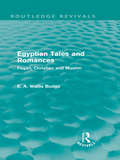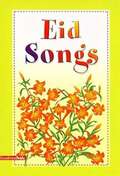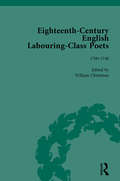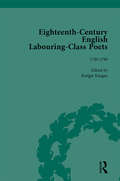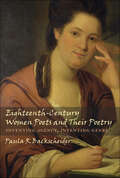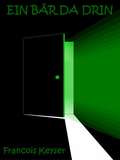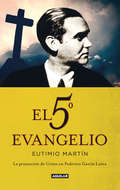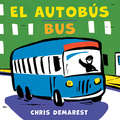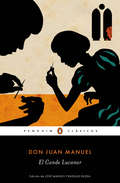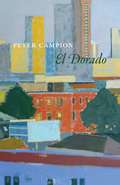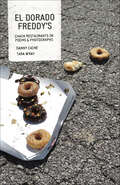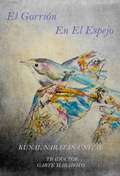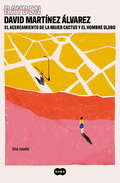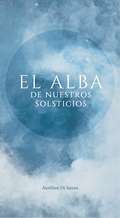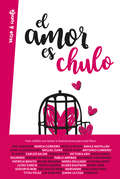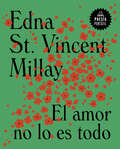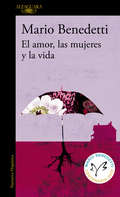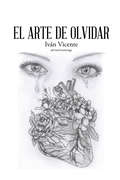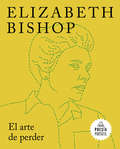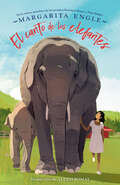- Table View
- List View
Egyptian Colloquial Poetry in the Modern Arabic Canon
by Noha M. RadwanNoha Radwan offers the first book-length study of the emergence, context, and development of modern Egyptian colloquial poetry, recently used as a vehicle for communications in the revolutionary youth movement in Egypt on January 25th 2011, and situates it among modernist Arab poetry.
Egyptian Tales and Romances: Pagan, Christian and Muslim (Routledge Revivals)
by E. A. BudgeSir E. A. Wallis Budge (1857-1934) was Keeper of the British Museum’s department of oriental antiquities from 1894 until his retirement in 1924. Carrying out many missions to Egypt in search of ancient objects, Budge was hugely successful in collecting papyri, statues and other artefacts for the trustees of the British Museum: numbering into the thousands and of great cultural and historical significance. Budge published well over 100 monographs, which shaped the development of future scholarship and are still of great academic value today, dealing with subjects such as Egyptian religion, history and literature. First published in 1931, Egyptian Tales and Romances examines the historical and religious romances of the Egyptians from the early dynastic period to the twentieth century. Budge demonstrates Egypt’s transition from Paganism to Christianity, and finally to Islam, through tales and stories carefully transcribed and translated. Part I contains historical romances written on papyrus and stone, whilst parts II and III are derived largely from Coptic and Muslim manuscript sources. Including detailed illustrations and photographs, this fascinating classic work will be of interest to academics and students of Egyptian folklore, archaeology and history, as well as the general inquisitive reader.
Eid Songs
by Fawzia GillaniThis is a nice collection of songs, which will have special meaning for those who celebrate the Muslim holidays. "Thank Allah *** Hands to your ears, Hands by our sides, Turning to the Kabah, To Allah we pray. We thank Him for Eid, We thank Him for the day, We thank Him for everything He passes our way."
Eighteenth-Century English Labouring-Class Poets, vol 1
by John Goodridge Simon Kövesi David Fairer Tim Burke William ChristmasPoets of labouring class origin were published in Britain in the 18th and 19th centuries. Some were popular and important in their day but few are available today. This is a collection of some of those poems from the 18th century.
Eighteenth-Century English Labouring-Class Poets, vol 2
by John Goodridge Simon Kövesi David Fairer Tim Burke William ChristmasPoets of labouring class origin were published in Britain in the 18th and 19th centuries. Some were popular and important in their day but few are available today. This is a collection of some of those poems from the 18th century.
Eighteenth-Century Women Poets and Their Poetry: Inventing Agency, Inventing Genre
by Paula R. BackscheiderCo-Winner, James Russell Lowell Prize, Modern Language Association This major study offers a broad view of the writing and careers of eighteenth-century women poets, casting new light on the ways in which poetry was read and enjoyed, on changing poetic tastes in British culture, and on the development of many major poetic genres and traditions. Rather than presenting a chronological survey, Paula R. Backscheider explores the forms in which women wrote and the uses to which they put those forms. Considering more than forty women in relation to canonical male writers of the same era, she concludes that women wrote in all of the genres that men did but often adapted, revised, and even created new poetic kinds from traditional forms.Backscheider demonstrates that knowledge of these women's poetry is necessary for an accurate and nuanced literary history. Within chapters on important canonical and popular verse forms, she gives particular attention to such topics as women's use of religious poetry to express candid ideas about patriarchy and rape; the continuing evolution and important role of the supposedly antiquarian genre of the friendship poetry; same-sex desire in elegy by women as well as by men; and the status of Charlotte Smith as a key figure of the long eighteenth century, not only as a Romantic-era poet.
Eighteenth-Century Women Poets and Their Poetry: Inventing Agency, Inventing Genre
by Paula R. Backscheider“Our sense of eighteenth-century poetic territory is immeasurably expanded by [this] excellent historical and cultural” study of UK women poets of the era (Cynthia Wall, Studies in English Literature).This major work offers a broad view of the writing and careers of eighteenth-century women poets, casting new light on the ways in which poetry was read and enjoyed, on changing poetic tastes in British culture, and on the development of many major poetic genres and traditions.Rather than presenting a chronological survey, Paula R. Backscheider explores the forms in which women wrote and the uses to which they put those forms. Considering more than forty women in relation to canonical male writers of the same era, she concludes that women wrote in all of the genres that men did but often adapted, revised, and even created new poetic kinds from traditional forms.Backscheider demonstrates that knowledge of these women’s poetry is necessary for an accurate and nuanced literary history. Within chapters on important verse forms, she sheds light on such topics as women’s use of religious poetry to express ideas about patriarchy and rape; the important role of friendship poetry; same-sex desire in elegy by women as well as by men; and the status of Charlotte Smith as a key figure of the long eighteenth century, not only as a Romantic-era poet.Co-Winner, James Russell Lowell Prize, Modern Language Association
Ein Bär da drin
by Francois KeyserRick findet nach Einbruch der Dunkelheit einen Bären in seinem Haus und hat Angst. Seine Eltern können den Bären nicht finden und denken, dass er Alpträume hat. Aber der Bär ist echt. Die Frage ist jedoch, ist der Bär ein Freund oder ein Feind? "Ein Bär da drin" ist die Geschichte, die Kinder jede Nacht erleben. Es geht um die Angst der Kinder vor der Dunkelheit und um Monster im Dunkeln. Es soll den Kindern zeigen, dass sie nichts zu befürchten haben und dass das Spielzeug, das sie manchmal nach Einbruch der Dunkelheit fürchten, nicht wirklich beängstigend ist. Wir alle können uns auf unsere Kindheitsängste vor der Dunkelheit als Kinder oder Eltern beziehen. In Reimen geschrieben, liest sich diese Geschichte gut und sorgt für gutes Schauspiel und Geschichtenerzählen für Jugendliche, die ihnen helfen können, sich an die Geschichte zu erinnern und keine Angst vor der Dunkelheit zu haben.
Ekphrastic Medieval Visions
by Claire BarbettiExplores the transformative power of ekphrasis in high and late medieval dream visions and mystical visions. Demonstrates that medieval ekphrases reveal ekphrasis as a process rather than a genre and shows how it works with cultural memory to transform, shift, and revise composition.
El 5º evangelio: La proyección de Cristo en Federico García Lorca
by Eutimio MartínFederico García Lorca trató de restablecer el mensaje evangélico y para ello se propuso ofrecer en su obra un quinto evangelio. Los escritos juveniles del poeta granadino proyectan sobre la totalidad de su obra un marcado relieve de heterodoxia sociorreligiosa encaminada a la propagación de un humanismo mesiánico. El escritor Federico García Lorca se ha impuesto la ineludible responsabilidad de ofrecer, implícito en su obra, un nuevo evangelio. Eutimio Martín, catedrático emérito de la Universidad de Aix en Provence, realiza un amplio y profundo recorrido por la obra del universal escritor. Basándose en una sólida documentación, literaria y gráfica (a menudo desconocida y a veces inédita), analiza y comenta magistralmente textos en extremo crípticos, rescata al autor del asfixiante folclorismo en que se ha visto encerrado por una crítica miope o malintencionada, desvela la decisiva influencia de Victor Hugo, la impronta cervantina, el impacto de Antonio Machado y la radical aspiración al reconocimiento de una vertiente sexual a la que en modo alguno estaba dispuesto a renunciar porque en ello le iba la pérdida de su identidad. La abultada dimensión crística de la obra de Federico García Lorca puesta en evidencia por Eutimio Martín no dejará de suscitar una enriquecedora controversia.
El Amor, las Mujeres y la Vida
by Mario BenedettiEl amor, las mujeres y la vida reúne los mejores poemas de tema amoroso escritos por Mario Benedetti: tanto como decir uno de los poetas latinoamericanos más innovadores, frescos, divertidos, ambiciosos y modernos de la literatura en lengua española. De hecho, Mario Benedetti es uno de los escasos poetas actuales que han establecido contacto con el público lector. Sus libros se venden por miles de ejemplares y sus poemas se convierten en canciones o se quedan prendidos en la memoria de todos. La popularidad de Benedetti está en un nivel altísimo, sólo comparable a la de otros grandes poetas amados de todo el mundo: Alberti, Lorca, Machado, Neruda. Los jóvenes hacen cola para comprar sus libros, los mayores lo tienen por modelo admirable. Estos poemas demuestran, sobre todas las cosas, la fuerza de las mujeres y de ese antídoto de la muerte que ellas solas poseen: el amor. El CD que acompaña la publicación en papel de este ejemplar de El amor, las mujeres y la vida contiene una selección de los poemas efectuada por el propio autor. Es también Mario Benedetti quien los lee, dándoles el tono y la significación que nadie más podría darles.
El Autobús/Bus
by Chris Demarest Carlos CalvoBus rolls. Busy street. First stop, people meet. El autobús avanza. La calle está llena. En la primera parada, la gente espera. The big, colorful, noisy city comes to life in this deceptively simple rhyming book. Little listeners will be mesmerized by the rhythmic, rhyming ride—perfect reading for kids on a roll!
El Conde Lucanor
by Don Juan ManuelThis illustrated collection features the 51 stories of Count Lucanor, tales of bravery, deceit, romance, and other themes featuring characters from all walks of medieval Spanish life, including courtiers, farmers, and beggars. At the outset of each story, the Count poses a situation or dilemma to Patronio, his trusted advisor, who counsels his master using a short story with a moral. This carefully adapted edition will entertain adolescent readers as it introduces them to one of the great classics of Spanish literature. Esta colección ilustrada incluye los 51 cuentos del conde Lucanor, relatos de valentía, decepción, romance y otros temas en los que se destacan personajes de todos los ámbitos de la sociedad medieval española, incluyendo cortesanos, granjeros y mendigos. Al comienzo de cada cuento, el conde le plantea una situación o un dilema a Patronio, su consejero de confianza, quien aconseja a su amo usando cuentos cortos didácticos. Esta edición cuidadosamente adaptada entretendrá a los lectores adolescentes a la vez que les presenta uno de los grandes clásicos de la literatura castellana.
El Dorado
by Peter CampionIn El Dorado, Peter Campion explores what it feels like to live in America right now, at the beginning of the twenty-first century. Splicing cell-phone chatter with translations of ancient poems, jump-cutting from traditional to invented forms, and turning his high-res lens on everything from box stores to trout streams to airport lounges, Campion renders both personal and collective experience with capacious and subtle skill.
El Dorado Freddy's: Chain Restaurants in Poems & Photographs
by Danny Caine Tara WrayA charming and accessible collection of poems dedicated to one of the most American of inventions—fast food. &“I went back for seconds.&” —Dallas Crow, Rain Taxi Review of Books El Dorado Freddy&’s may be the first book of fast-food poetry. In poems like &“Olive Garden,&” &“Culver&’s,&” &“Popeye&’s Louisiana Kitchen,&” &“Cracker Barrel,&” &“Applebee&’s (after James Wright),&” Danny Caine—owner of the Raven Book Store in Lawrence, Kansas—&“reviews&” chain restaurants, bringing our attention to a slice of American life we often overlook, even though it&’s everywhere. Along the way, he touches on such topics as parenting, the Midwest, politics, and the pitfalls of nostalgia. Caine&’s wry, deceptively accomplished poems are paired with Tara Wray&’s color-drenched photos. The result is a literary yet goofy homage to American food and identity, set in a midwestern landscape dotted by the light of fast-food restaurants&’ glowing signs. Perfect for those readers who love both poetry and Popeye&’s. &“Caine&’s work has a tongue-firmly-planted-in-cheek appeal that is sly enough to fool the people who believe Popeye&’s chicken could be considered healthy, and funny enough to make the rest of us laugh, or groan, to ourselves. Wray&’s images in El Dorado Freddy&’s are understated in their Steven Shore-esque ability to capture the essence of a meal when we&’d rather not admit to, but cannot stop from embracing.&” —Cary Benbow, F-Stop Magazine
El Gorrión En El Espejo
by CAPT KUNAL NARAYAN UNIYAL Garye Maraboto RouxDesde el primer acto de desobediencia, el hombre ha estado en una lucha constante contra su mayor adversario: EL EGO. Mientras más le entrega el hombre al ego, más se aleja de su ser divino. Su motivación materialista, su búsqueda de poder y su desagradable indiferencia lo aísla y lo distancia de este ser. Esclavizado por su ego el hombre se deleita con falso orgullo, falsa gloria y aún más falsa seguridad. La búsqueda nunca termina. La sed nunca es saciada. La mente permanece preocupada. El corazón hierve, perturbado. La razón fría oculta la sabiduría y la necesidad humana de justificación. Aun así, el Señor tiene un plan mayor. A todos se nos ha entregado su reino, está dentro de nosotros. En el momento en el que iniciamos nuestro viaje hacia adentro la neblina comienza a disiparse. La sabiduría infinita surge. El ruido cesa y la calma llega. Alegría verdadera sale del corazón y nos conduce a la paz, la harmonía y al equilibrio. Lo único que se necesita es detenerse y mirar al interior.
El acercamiento de la mujer cactus y el hombre globo
by Rayden¿DE QUÉ LADO ESTÁ TU CORAZÓN? La primera novela de David Martínez Álvarez, RAYDEN, es un canto al valor de lo diferente. Una historia de amor a golpe de extremos. Un volcán despierto. DESCUBRE AL ESCRITOR TRAS LAS CANCIONES «No sé qué fue antes, si la canción o la novela, pero gracias a la mujer cactus y al hombre globo por acercar posturas. En un mundo donde tachan de imposible lo diferente, mi corazón está del lado de los improbables que se atreven».David Martínez Álvarez, Rayden Sáhara ama las flores aunque tiene nombre de desierto. Sáhara trabaja en el negocio familiar. Una pequeña floristería en Malasaña. Ciro es un joven lleno de aspiraciones frustradas. Vive en una habitación en Lavapiés. Ciro choca con Nicolás, un repartidor de comida. Decide suplantar su identidad y trabajar con su nombre. Nico-Ciro y Sáhara chocan en el Ojalá. Abren varias puertas que son volcanes. Y deciden arder. David Martínez Álvarez se desviste de Rayden y construye una novela que es poesía, teatro, tragicomedia, alegoría y caos en su debut como escritor. El acercamiento de la mujer cactus y el hombre globo es una historia de amor urbano contada a cañonazos donde la verdad aflora como un mosquito en el zumo.
El alba de nuestros solsticios
by Beatriz Portero García Aurélien Di Sanzo"Sueño con un páramo desconocido, con senderos por los que nadie ha caminado, con mares infinitos y cielos despejados. Sueño con un refugio que escape del paso del tiempo, de un lugar secreto en el que mi alma podrá descansar en total serenidad, sueño con tomarla de la mano y guiarla hacia un firmamento alejado en el que nadie pueda encontrarnos". [...] "Pero, ¿dibujar, escribir poesía, respirar y vivir, no es eso al fin y al cabo? Rehacer las cosas hasta el infinito, hasta que la última luz del horizonte se apague como una vela que un niño sopla por descuido".
El amor es chulo
by Stephaniè AndugarLa poesía y la reflexión feminista se unen en estas páginas para gritar alto y claro «NO» al machismo disfrazado de amor: los mitos del amor romántico. Mitos que solo sirven para perpetuar la desigualdad y naturalizar la violencia: Amor-sufrimiento, Amor-dependencia, Amor-fusión, Amor-posesión... ¿¿Amor?? No es amor cuando te dice que te quiere solo para él. No es amor cuando hay celos. No es amor si te tiene que completar. No es amor si te aparta de las personas que quieres y de lo que te hace sentir bien. No es amor si es sacrificio o renuncia. No es amor si pierdes tu esencia. No es amor si duele. El amor, el de verdad, no entiende de sexos ni peldaños ni jaulas, no tiene que ser difícil ni tampoco lo único, no te hace sentir pequeña. Para conjugar el verbo amar en plural, primero hay que saber hacerlo en singular y desprenderse de todo aquello que nos encadena. Que el amor valga toda tu alegría y no tu pena,porque el amor es chulo. El amor es chulo, el proyecto que une la nueva poesía y el feminismo y que pretende derribar los falsos mitos del amor romántico. Han cedido sus textos e ilustraciones para este libro:Ane Santiago, Marga Cordero, Irene G Punto, Davile Matellán, Mina Ilustraciones, Miguel Gane, Grace Klimt, Antonio Carreño, Silenzio, Carlos Salem, Teresa Mateo, Victoria Ash, Diego Ojeda, Sourires, Nekane González, Pablo Arribas, Ana Pérez Cañamares, Patricia Benito, Selam Wearing, Nerea Delgado, Acto Paulson, Luiso García, Pedro Andreu, Ulises Kaufman, María Vera, Señorita Bebi, Tres Voltes Rebel, Martaeme, Ana Elena Pena, Titxu Vélez, Lae Sánchez, Juana La Coja y Versales.
El amor no lo es todo
by Edna St. Vincent MillayLa poeta Luna Miguel selecciona en este Poesía Portátil los mejores versos de Edna St. Vincent Millay, considerada la mejor poeta mujer desde Safo según la revista Poetry. Piénsalo, mi antiguo amado, mi ya no adorado, ¿hay que negar que fue amor solo porque se ha agotado?Edna St. Vincent Millay es una de las poetas norteamericanas más fascinantes y menos conocidas del siglo XX. Perteneciente a la generación de T.S. Eliot y Wallace Stevens, su militancia feminista y su radical independencia provocaron que su obra tardara en difundirse, a pesar de haber ganado el Premio Pulitzer (1923). Su personalidad arrolladora congregó a multitudes en sus lecturas y polémicas apariciones públicas, que hicieron de ella una precursora de una nueva forma de ser mujer, liberada y bohemia, sin miedo a proclamar sus ideas políticas y proponer innovadoras vías de expresión de la experiencia femenina. La crítica ha dicho:«Consiguió que la poesía pareciera algo sencillo que cualquiera podía hacer, pero naturalmente no era así».Dorothy Parker
El amor, las mujeres y la vida (Colección Visor De Poesía Ser. #Vol. 341)
by Mario BenedettiEste libro reúne los mejores poemas de amor escritos por Mario Benedetti, uno de los poetas más innovadores, divertidos, ambiciosos y modernos de la literatura en español. El amor, las mujeres y la vida recoge una selección de poemas aclamados por varias generaciones, aquellos en los que Benedetti vuelca su concepción de la vida: el amor como compensación de la muerte se levanta en sus versos lleno de fe, como fuerza principal que mueve al ser humano, como una proclama de la existencia, que va de la erótica del amante hasta la esperanza del revolucionario o la gratitud del amigo. «El amor es uno de los elementos emblemáticos de la vida. Breve o extendido, espontáneo o minuciosamente construido, es de cualquier manera un apogeo en las relaciones humanas.»Mario Benedetti
El arte de amar
by OvidOvidio nació en el año 43 a. C. en Sulmo, no muy lejos de Roma, y murió desterrado en una remota aldea del Ponto, Tomis. El arte de amar y El remedio del amor, entre otros motivos, ocasionaron su destierro, que le fue impuesto por Augusto, quien permaneció siempre implacable a los ruegos del poeta para que le permitiese regresar a Roma. Escritos con refinamiento poético, con talante lúdico y un tanto irónico, muy atentos a las escenas amorosas y a las peripecias eróticas, utilizando con desenfado los antiguos mitos clásicos, estos libros son tratados con ligereza, e incluso con "levedad", que es lo que confiere a su autor una modernidad indiscutible. Están inspirados por una misteriosa mujer, Corina, que no sabemos si corresponde a una figura real, pero que Los amores hicieron tan famosa como la Lesbia de Catulo, o la Cintia de Propercio.
El arte de olvidar
by Iván VicenteYa lo decía Neruda: «Qué corto es el amor...». Ahora, nos toca aprender el arte más prolongado del ser humano: el arte de olvidar. El arte de olvidar: En el Griego antiguo, la palabra «olvidar» significaba «en contra de lo oscuro». <P><P>En esa oscuridad se ocultan nuestros miedos, nuestra nostalgia, nuestra incertidumbre, todos aquellos recuerdos que queremos olvidar. Es en esa penumbra donde nace este arte, el arte de olvidar, el que nos enseña que no hay forma de hacerlo, sino es amando nuestros miedos muy fuerte, hasta convertirlos en nuestro castillo.
El arte de perder
by Elizabeth BishopLa colección «Poesía Portátil» une en esta selección los versos más icónicos de Elizabeth Bishop, clave en la poesía norteamericana del siglo XX. Heredera natural de Whitman y Dickinson, Bishop fue una figura desconocida durante años. Detrás de la aparente sencillez con la que revestía sus textos se escondía un calado intelectual que muchos de sus contemporáneos no supieron valorar. Lúcida, precisa, rigorosa, retraída y atrevida, Bishop se situó finalmente entre las figuras clave de la poesía norteamericana del siglo XX. Incansable viajera, nos abre las puertas a su particular mundo a caballo entre distintos países, hogares y obsesiones. De Francia a España, del norte de África a Irlanda, de Italia a México, además de los casi veinte años que vivió en Brasil junto a su entonces pareja, la aristócrata y arquitecta brasileña Lota de Macedo Soares (1910-1967), Elizabeth Bishop fue una mujer libre, que llevó esa libertad hasta sus últimas consecuencias, también creativas.
El canto de los elefantes / Singing with Elephants
by MARGARITA ENGLEUna poderosa novela en verso escrita por Margarita Engle, ganadora de los prestigiosos premios Newbery y Pura Belpré. Una historia sobre la sanadora amistad que surge entre una jovencita nacida en Cuba y la poeta Gabriela Mistral. Oriol nació en Cuba, pero vive en Santa Bárbara, California, donde no logra encontrar su sitio. Sin embargo, pasa muchos buenos momentos cuando ayuda a sus padres en la clínica veterinaria de la familia, donde cuidan animales heridos. La primera ganadora latinoamericana de un Premio Nobel de Literatura, la poeta Gabriela Mistral, se muda entonces a Santa Bárbara, y Oriol se descubre confesándole que aspira a ser escritora. Cuando la jovencita descubra que alguien está amenazando la vida de un pequeño elefante en la clínica de sus padres, decide tomar acción para protegerlo. Necesitará poesía, coraje y fortaleza para hacer lo que cree correcto. Una historia escrita con una profunda belleza lírica, que ilumina el poder de la amistad entre generaciones, entre humanos y animales, así como el poder de la poesía para inspirar acción, justicia y aceptación.

